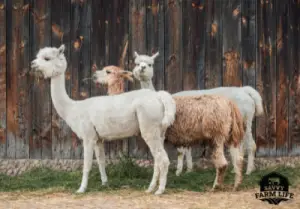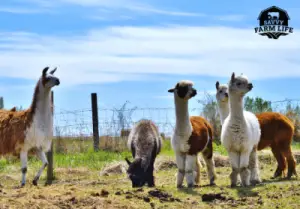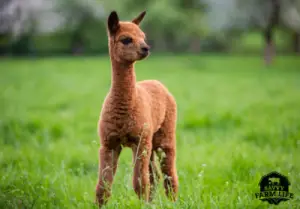Are Alpacas Friendly?
Alpacas are great for fiber production and can be entertaining to watch, but a common question to ask is whether or not they’re friendly towards humans.
So, are alpacas friendly? Alpacas can be somewhat friendly pets, but they will never be as affectionate as the family dog. Alpacas are not naturally fond of being petted, and some behaviors exhibited by dogs as affection and playfulness are actually aggressive behaviors in alpacas that should be strongly discouraged before they escalate to dangerous levels.
If you want to learn more about how friendly or unfriendly alpacas can be, read on.
Are Alpacas Friendly Enough To Make Good Pets?
If you want an affectionate animal to live indoors with you, then the answer is, unfortunately, no. Alpacas are too big to live in a house and they are herd animals who require others of their own kind to socialize with. And physical contact, in general, is not a sign of affection with alpacas, but rather a sign of sizing up whether they can beat you in a fight.
But alpacas are excellent animals for fiber production and if you are looking for a type of farm animal who needs less space than horses or cows. They are entertaining to watch and many can become comfortable enough with you to approach and accept a treat from your hand. That is a good level of friendship to have with an alpaca.

Do Alpacas Spit Because They Aren’t Friendly?
If you’re thinking about getting an alpaca, you might be wondering if the do in fact spit. The answer is yes, they do. And not only do they spit, but they have two different kinds of spit. The first is regular old saliva. This is the first projectile that will be sent your way if you get too close to an alpaca who doesn’t appreciate your proximity.
If you continue to annoy the alpaca in question, they’ll bring out the big guns. They can actually bring up partially digested, super smelly, grassy stomach contents, and they will send that spit-wad right into your face. It is nasty.
Being spit on by an alpaca is typically a fate easily avoided. They don’t really spit as frequently as the media has led us to believe, but when they do, they’re just trying to let you know that they don’t feel comfortable with how close you, a strange creature, are in proximity to them. They’re not trying to be mean. They’re just trying to keep themselves safe from potential predators.
If you back off after the first warning saliva, they’ll very likely leave you alone. But if you keep making them uncomfortable, they’ll let you know their feelings.
Unfriendly/Aggressive Behaviors To Discourage In Alpacas
Appropriate alpaca behavior when approaching a human should include the tail held upright and the neck lowered. The animal should be moving at a slow walk. This is a submissive form of alpaca body language saying that they are politely curious but not going to start any trouble or challenge you for your place in the herd. An alpaca approaching you like this may be rewarded with a small treat if you’d like.
The head held erect with the neck stretched out is a sign of a challenge. Or at least of the alpaca feeling unfriendly toward you. It’s best not to approach an alpaca displaying this kind of body language.
If an alpaca runs at you, get out of the way asap. Males attempting to dominate other herd members will leap into the air and launch their whole body weight at those they want to challenge. They’ve been known to do this to humans, and it can be very dangerous. While they are smaller-bodied than horses or cows, a full-grown male flying through the air to knock you over will not feel good.

Preventing Unfriendly Alpaca Behaviors Early
Oftentimes alpacas develop aggressive tendencies toward humans early on. This is particularly problematic in males exhibiting Berserk Male Syndrome. This is an unfortunate thing that happens to intact male alpacas and llamas, particularly those raised too closely with humans.
Alpacas need to grow up with their own kind in order to learn the rules and manners of being an alpaca. When an alpaca is raised by humans—either as a cute pet or by a well-meaning farmer who stepped in when a mother alpaca passed away or couldn’t produce enough milk—it misses out on that alpaca manners education.
Berserk Male Syndrome occurs most commonly in males who were bottle-raised and not kept with the herd enough as they grew up. When they hit breeding age and the hormones kick in, they think they can take on every alpaca, human, or anything else around. And they will. The danger from a berserk male is so significant that they often must be put down to protect not only the humans around them but even other herd members.
Castrating males who have been raised closely with humans before they reach sexual maturity may help prevent this problem. But the best prevention is to let baby alpacas grow up among their own kind as they were intended to if at all possible.
Friendly Alpaca Behaviors To Encourage
Alpacas are very vocal animals. They use whistling, clicking, and humming to communicate.
Whistling is usually more of a warning sound. They make this vocalization to warn fellow herd members of danger approaching. This is a good behavior because it can benefit not only your alpaca herd but also your sheep or cows or whatever else you have nearby. All animals will become alert to the danger and be prepared to act accordingly. Guard dogs will pick up on it too and start barking to ward off predators and let them know they’ve been caught.
Mother alpacas make clicking sounds to their babies. Each alpaca has a distinct sound that the baby will learn soon after being born. This will help them to find each other in the crowd of the herd. Sometimes clicking among adults is a sign of annoyance or a reminder of dominance. Keep an eye on the alpaca’s body language when you’re determining whether the clicking is a good sign for your approach in context.
Alpaca humming is even more interesting. Humming is something all alpacas do from time to time when they are simply enjoying their time grazing in a field. But male alpacas also hum to the females they seek to court. Which is a pretty cute trait for alpacas to have.

